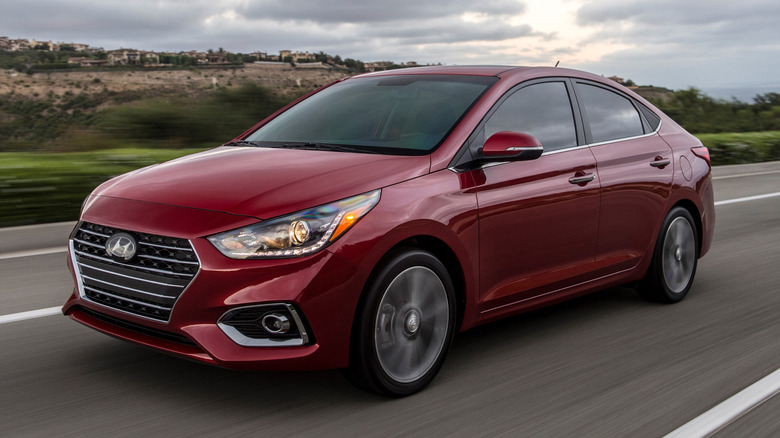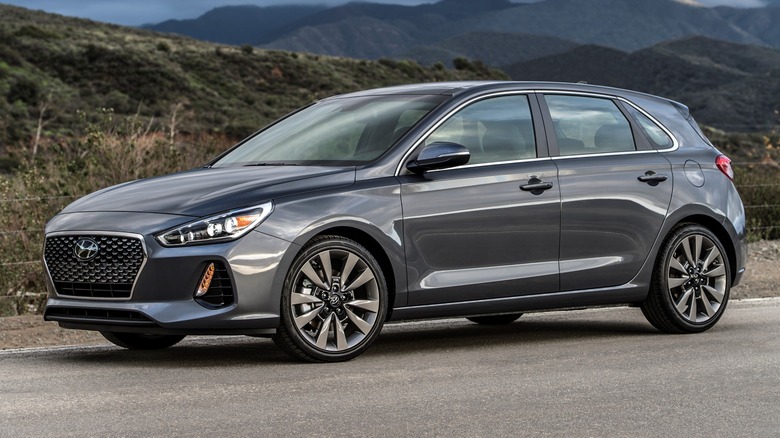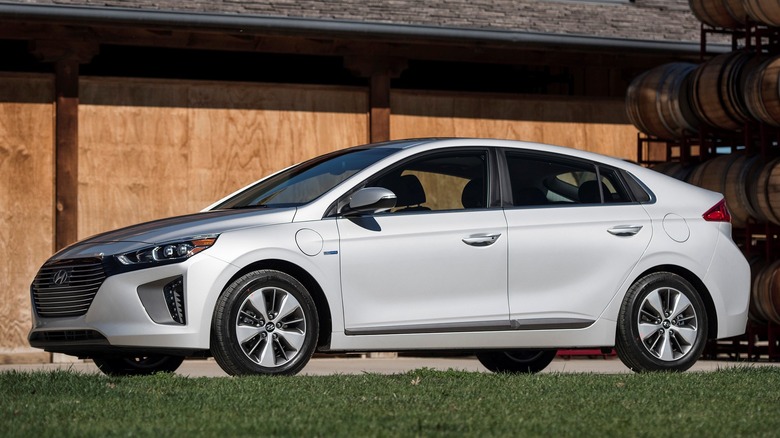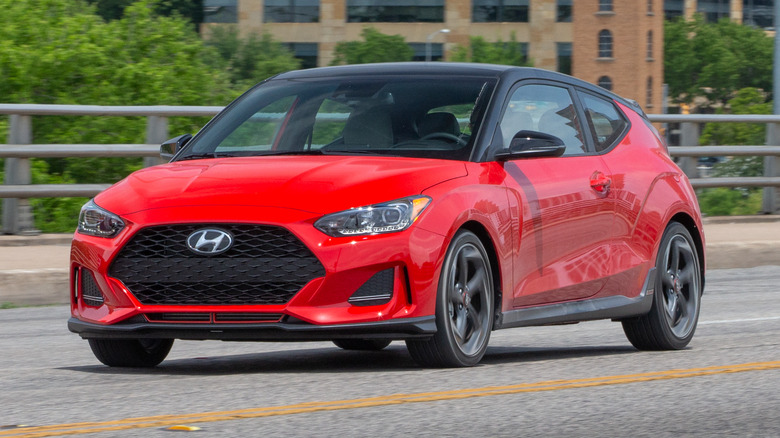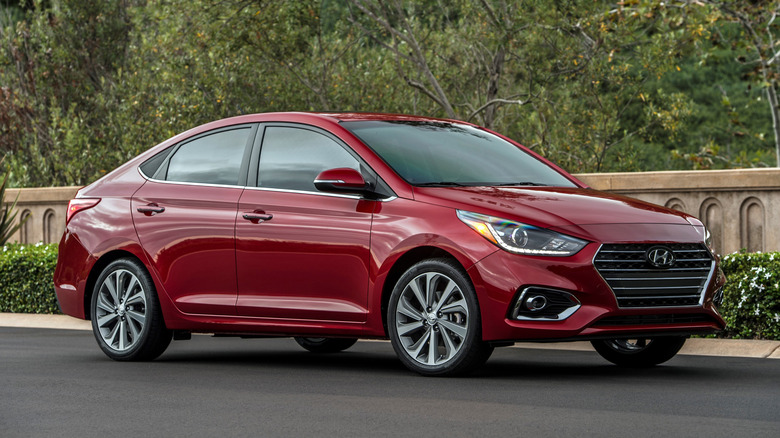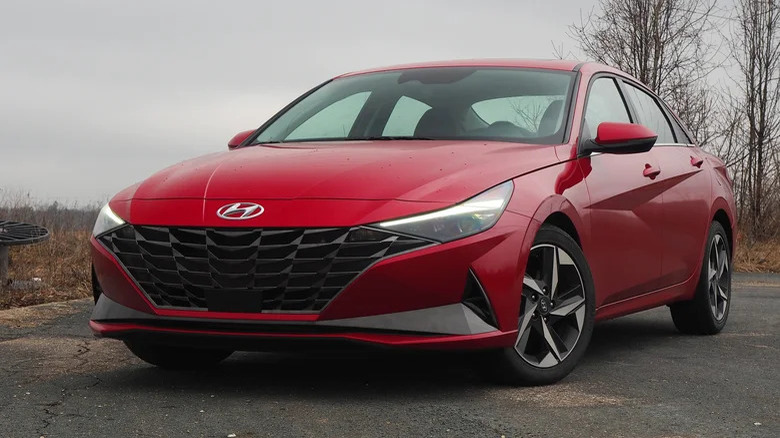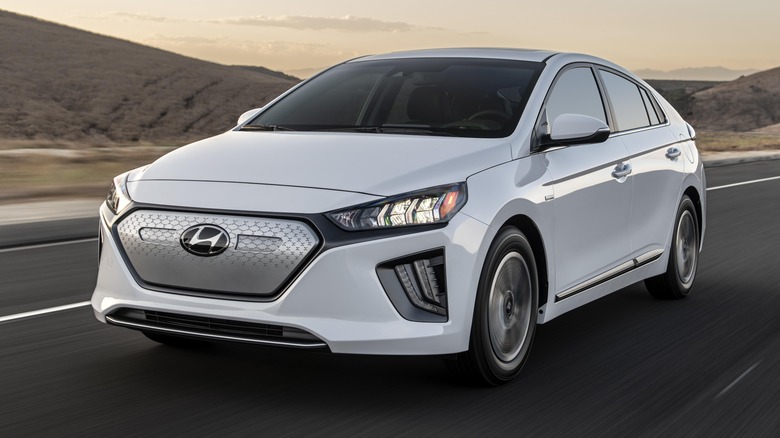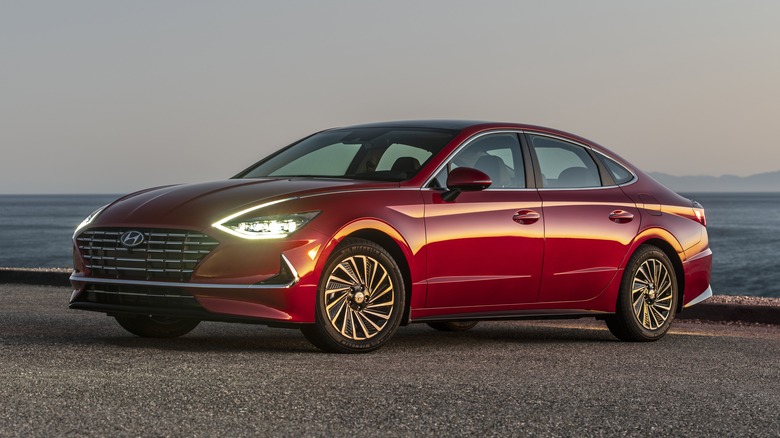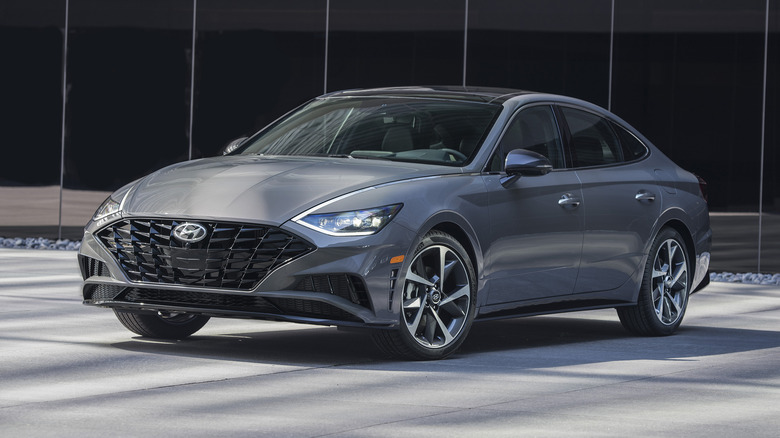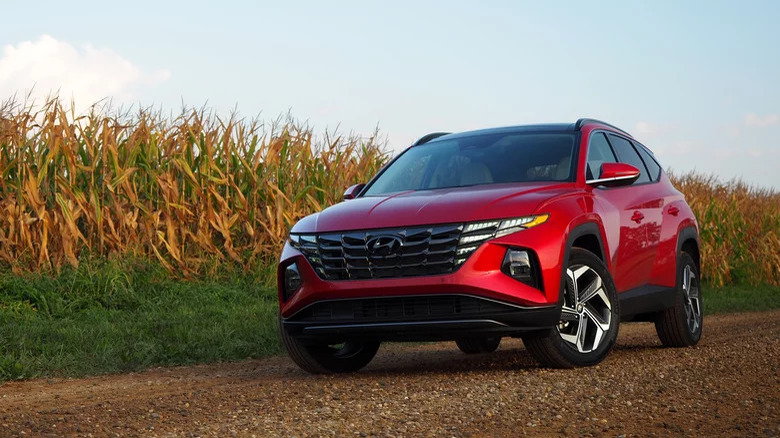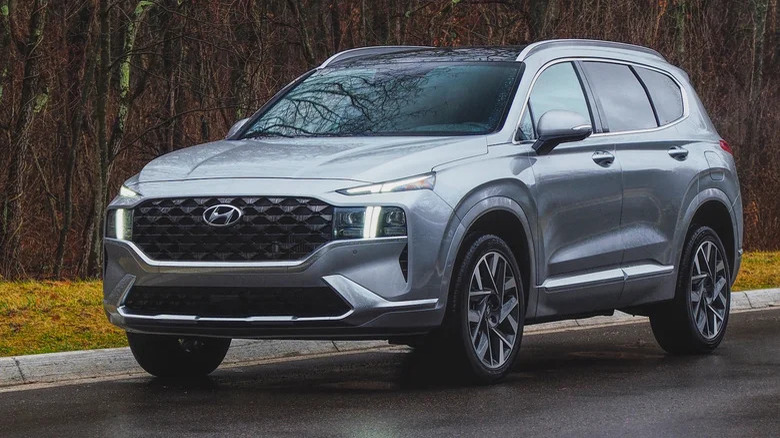The Most Reliable Hyundai Models Ever Built, Ranked
One of the key considerations for any buyer looking for a new budget-oriented car is reliability — there's no point having a car that's cheap to buy up front if it's going to cost more in the long run. South Korean carmaker Hyundai has proved it's generally competitive in that regard, with strong ratings across almost all of its lineup. It should be said that a number of recent recalls, including a particularly troubling engine fire recall affecting older Hyundai vehicles, has dented consumer confidence in the brand. However, current data suggests that the Hyundai models on the road continue to be reliable as a whole, despite those issues.
The data we've used to rank the most reliable models comes from iSeeCars, which analyzed over 12 million used car listings to determine which models lasted longer than average, both in terms of age and mileage. Each car is rated on a ten-point scale, although a disclaimer here: These are simply averages, and won't represent the experience of every owner. Also, the brand's newest models might not have appeared in enough listings to receive ratings yet, and so aren't included here. That said, these ten Hyundais have proven to be among the best in their respective segments, and boast reliability ratings on par with, or above, their primary competitors.
Hyundai Elantra GT
The Elantra GT faced an uphill sales battle in the U.S. It was a small, economy-minded hatchback, competing in a market where neither small cars nor hatchbacks really held much appeal. Nonetheless, our review of the 2018 model proved the car packed more punch than its low starting price would suggest, both in terms of driving enjoyment and practicality. In fact, the latter was particularly impressive: Our reviewer noted that the Elantra GT's cargo space equaled that of many pricier crossovers on the market at the time.
However, its charms didn't convert into actual sales, and the Elantra GT was killed off to make more space in Hyundai's lineup for the lucrative SUVs and crossovers that are dominating the market. So, the only option today is to buy one used, which is still a fairly safe bet: iSeeCars gives the model a commendable, although not class-leading, reliability ranking of 7.1/10.
Hyundai IONIQ plug-in hybrid
The IONIQ served as Hyundai's transition model when first entering the EV space, being originally available in three flavors: Hybrid, Plug-In Hybrid, and Electric. While it was the electric that garnered the most attention, the Plug-In Hybrid was arguably the better option for many people, especially when it first launched; non-Tesla charging facilities around the country were limited, so a plug-in gave drivers the freedom to use electric power around town without worrying about running out of charge on longer journeys.
The IONIQ wasn't the brand's most exciting car to drive, but it did come with plenty of tech as standard, which was further upgraded in a mid-life refresh in 2019. The arrival of Hyundai's IONIQ EV range saw the original IONIQ model retired, and its plug-in powertrain retired and replaced by a range of battery-only models, but it's still a solid used pick, with an iSeeCars reliability rating of 7.2/10.
Hyundai Veloster
Hyundai's slightly oddball sporty hatchback was another casualty of the market's insatiable appetite for larger cars, with its most recent generation axed only a few short years after its debut in 2018. The Veloster was one of the cheapest cars on the market at launch, with a sub-$20,000 starting price, but its 2.0L four-cylinder ensured its driving dynamics were a cut above the average econobox.
A six-speed manual transmission was offered as standard with the Turbo version of the car, alongside an optional seven-speed DCT. Interior space was competitive, although not exceptional, for the segment, with close to 20 cubic feet of cargo space available, but practicality was never really the Veloster's main appeal. Rather, it was a small, athletic car at an affordable price, although that combination didn't attract enough buyers to save it from the chopping block. Neither did its decent reliability rating, which according to iSeeCars, is ranked at 7.5/10.
Hyundai Accent
Another budget Hyundai that was overhauled in 2018 was the Accent, a compact car with competitive cargo space and decent equipment levels given its low starting price. Available extras included niceties like heated front seats, Android Auto and Apple CarPlay connectivity, and a forward collision avoidance system. Also new for 2018 was the revised exterior styling, which brought the car's design language closer in line with the rest of the brand's lineup at the time. In doing so, it arguably made the Accent one of the sharpest looking cars in its class.
The Accent is one of the longest running nameplates in Hyundai's history, but like many of its other cheap vehicles, it's now been retired to make way for a wider range of electrified vehicles and SUVs. That leaves it only available to buyers in used form, but even examples a few years old should still be reliable: the Accent's reliability rating according to iSeeCars stands at 7.7/10.
Hyundai Elantra
Our review of the latest generation Hyundai Elantra praised its economy, styling, equipment levels, and pricing — in other words, all the key elements most budget-conscious buyers will be looking for. It's worth noting that the 2023 Elantra was one of the Hyundai models affected by an August 2023 recall concerning a defective oil pump controller. However, assuming the recall work has been carried out, there's no indication that long-term reliability should be affected.
The Elantra has another problem, though, that's a lot harder to remedy: Larger vehicles rule the roost, and the Elantra can't even claim to be the roomiest sedan of its kind, either in terms of cabin space or luggage capacity. While it's a great contender in its segment, that segment only represents a small section of the market, and so unfortunately many buyers will never even consider the Elantra, despite its solid value for the money. Those that do should be rewarded with strong reliability, with iSeeCars giving the car a rating of 7.8/10.
Hyundai IONIQ Electric
As the South Korean automaker's first all-electric car, the IONIQ Electric needed to make a statement. It was, after all, Hyundai's announcement to the industry, an indication of its future plans. The initial version of the car wasn't quite as impressive as some had hoped, managing just 124 miles of range between charges, but the 2020 model year boosted that figure to 170 miles of range. Still hardly a blockbuster figure, but more reasonable considering the competition at the time.
The trouble was, the IONIQ Electric's styling wasn't quite as sharp as the brand's other models, and its range remained a limiting factor even after the upgrade. The car wasn't the hit that its maker wanted, and was withdrawn for 2022, being replaced by the much more eye-catching (and longer-running) IONIQ 5. While SlashGear recommends the IONIQ 5 over its predecessor, the IONIQ Electric still boasts a strong reliability rating of 7.9/10 according to iSeeCars.
Hyundai Sonata Hybrid
Another uniquely styled Hyundai sedan, the Sonata Hybrid's front end design is a bit of a love-it-or-hate-it affair. For those in the former camp, the car ticks all the right boxes for a family-friendly sedan: a roomy cabin, strong levels of equipment, and impressively fuel-sipping powertrains. One of the most unique features on our test vehicle was the solar roof, which looks impressive, but isn't particularly useful for everyday driving.
Even in the sunniest parts of the country, the solar roof will only generate enough power for a few extra miles of driving, although Hyundai claims it could add up to 808 miles of free driving a year in optimal conditions. It's safe to say most drivers won't get close to that, leaving the solar roof as more of an interesting tech demonstration than a genuinely game-changing innovation. That said, the cutting-edge tech didn't make a dent in its reliability rating, which iSeeCars scores at 7.9/10.
Hyundai Sonata
The non-hybrid Sonata is marginally more reliable than its electrified stablemate, although only just. We reviewed the Sonata N-Line in 2021 and found it to be one of the most enjoyable cars to drive in its segment, with its 2.5L turbo-four engine producing a respectable 290 horsepower and providing more than enough poke for spirited driving. It's also, unsurprisingly for a Hyundai, very competitively priced. Pair that with the generous equipment and ergonomic cabin of the regular Sonata, and the finished product is one that's well worth the premium over the base-spec Sonata.
Even buyers of the base-spec car won't be disappointed though, as value for money is still front and center here. Not only is that value evident in the up-front price, but also in the Sonata's top reliability rating, scoring 8.0/10 on iSeeCars'. With careful driving — not the type that the Sonata N-Line encourages — the car is also reasonably efficient too, although other rivals (and the Sonata Hybrid) will cost less at the pump in the long run.
Hyundai Tucson
Equally ranked alongside the Sonata is the Tucson SUV, one of the best-known Hyundai nameplates and also one of the most appealing cars in its class. By now, it should be no surprise what makes the Tucson a top pick — features, design, and price. And given its consistently strong sales, it seems buyers are already well aware of the Tucson's appeal. With such a popular model, any extensive redesign always comes with risk, but that didn't stop Hyundai from overhauling the interior and exterior for the 2022 model year.
Our reviewer was generally very impressed with the revisions, although did note a few sticking points: The infotainment on the top-spec model we tested was far from best in class, and a little unintuitive to use, and the engine didn't quite hit the mark either. Considering there's only one engine option available, that was a little disappointing, but it didn't stop us from recommending the car overall, thanks to the myriad improvements made over the (already impressive) outgoing model. That includes reliability, which is up to 8.0/10 according to iSeeCars.
Hyundai Santa Fe
Hyundai's most reliable model, according to iSeeCars data, is the Santa Fe, which gains an 8.6/10 rating. The Santa Fe sits in an extremely competitive segment, but its unique looks, plentiful safety technology, and sprightly turbocharged engine make it well worth considering. That engine, which our reviewer singled out as a particular highlight of the car, is unfortunately only available in higher-spec trims, but for those with the budget to spare, it's worth the upgrade.
The SUV isn't the most efficient in its class, and its infotainment touchscreen comes up a little short compared to Hyundai's larger SUVs, but overall, the Santa Fe is a solid offering. It takes a lot of the key elements that make the brand's recent cars so appealing and packages them all in a car big enough to haul most families, but affordable enough to be within most budgets. The fact that it's also the brand's most reliable model is simply a bonus.
